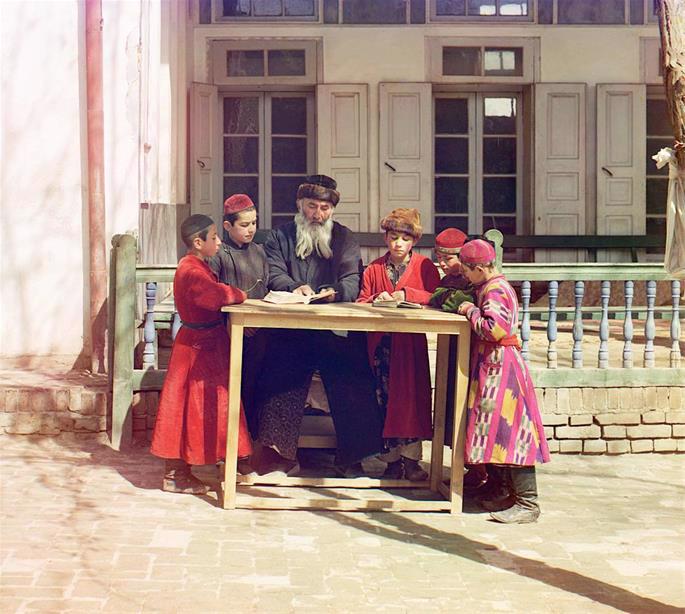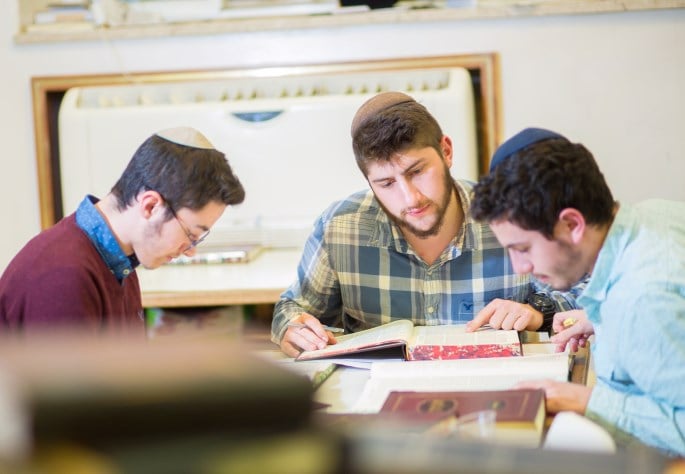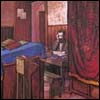Torah study occupies a central place in the landscape of Jewish life, influencing our spiritual aspirations, social interactions and the way we view ourselves and our surroundings. But how much do we really know about this activity?
1. It’s a mitzvah
The Shema we say twice daily includes the Biblical imperative to learn Torah: “And you shall teach [Torah] to your children, and you shall discuss it, when you sit at home, when you travel, when you lie down, and when you rise.”1
2. There is a minimum
Even those who are busy all day—making a living, caring for their families, and otherwise being productive citizens of G‑d’s world—can make time to learn Torah, at very least learning a portion every morning, and a portion every evening.
Start: Chabad.org Daily Study Portal

3. But there’s no maximum
We read in the Book of Joshua: “And this Torah book shall not leave your mouth, and you shall think about it day and night, so that you be careful to do all that’s written in it…”2 Indeed there are many who dedicate their lives to the consummate study of Torah, digging deeper and deeper into the sacred texts for novel and sublime layers of understanding.
4. It’s like hugging G‑d
The Torah is G‑d’s wisdom, which the Zohar teaches us is one with Him. When you wrap your mind around a Torah concept, it’s as close as you can ever get to hugging G‑d.3
Read: Are You a Jew in the Head?

5. Torah is an exceedingly broad field
In its narrowest sense, “Torah” refers to the Five Books of Moses. In its broader context, it can mean the entire Scripture (Tanach), the classic rabbinic texts (Talmud, Midrash, Halachah, etc.), the writings of the Kabbalists and the Chassidic masters, and their interpretations.
So what defines Torah? Perhaps, we can explain it as such: G‑d placed us in His world with a mission. But how are we to use the Divine resources He gave us to fulfill our mission? For that he gave us the owner’s manual—the Torah. Thus, any learning that helps us better understand how we are to behave as His servants can be included under the rubric of Torah study.
6. It’s important to understand the words
The words of the Written Torah are sacred, so that one who reads them, even without understanding, is performing a mitzvah. When it comes to rabbinic teachings, however, the main thing is the intent behind the words. As such, reading Talmud in Aramaic is a holy exercise, but not quite Torah study. On the other hand, reading a translation is mitzvah of the highest order.
Read: Must I Learn Hebrew?

7. There are special places to study Torah
Since Talmudic times, a room dedicated to Torah study is known as a beit midrash (“study house”). In addition to tables and chairs, a beit midrash (which typically doubles as a synagogue) has a library of Torah books, all free to use.
A yeshivahis an institution of Jewish learning, where (young) people spend days steeped in Torah study and spiritual pursuits. A kollel is a (relatively recent) institution, primarily comprising married men who have made Torah study a career. Of course, in addition to the regulars, one can often see civilians dropping in to learn Torah for 20 minutes, an hour, or even an evening.
The fact remains, however, that one may learn Torah virtually anywhere (except for the bathroom and other distasteful places), making that place into an ad-hoc beit midrash, sanctified by the activity taking place there at that time.
8. Torah study is referred to as “learning”
Perhaps influenced by the Yiddish term lernen, Jews typically refer to Torah study as learning. This is more than semantics. Studying implies gaining information and understanding of something outside of oneself. Learning, on the other, is all about applying that knowledge to yourself and changing your habits, outlook, and approach as a result of the knowledge mastered.

9. You need to do it for the right reasons
Learning Torah altruistically, for the simple goal of connecting to G‑d and doing His will, is referred to as lishmah (“for its own sake”). This is an important ideal. Yet, it should never be an impediment to learning. In the words of the sages: “A person should always engage in Torah study … [even if it is] not lishmah, for from not lishmah comes lishmah.”4
Read: I Feel Like a Hypocrite!
10. You can pick the topic
Within the broad swath of scholarship and inspiration found in the Torah, the individual student is free to choose to focus on topics he or she finds most engaging, rewarding and relevant. In the words of the sages: A person should always learn a place (i.e., subject) that his/her heart desires.5
Explore: Lots to Learn on Chabad.org

11. Review is important
Every year, we learn the Torah (Five Books of Moses) again, and a critical element of learning Torah is chazarah, returning to that which we have already learned and learning it again and again. In the Talmudic era, it was common to study the same piece 100 times, until it had been understood, internalized, and committed to memory.
Read: What Does Chazer Mean?
12. It’s ideal to learn with a partner
A well suited study-partner, known as a chavruta (or chavrusa) is crucial to Torah learning, as each chavruta builds upon the other’s understanding and adds insight that one person alone may not have attained.
Even those without the benefit of a local partner can take advantage of JNet, an organization that pairs people up for free weekly Torah study sessions over the phone.
13. It’s never too early to start learning
From the moment babies start to talk, Jewish parents teach them Shema, Torah tzivah, and other key Torah phrases. Teaching our children Torah, mandated by the Torah itself, is the obligation and honor of the parent, which they often choose to share with teachers, rabbis and others.
In modern times, much of this happens in the Jewish day school, where Torah subjects are taught for a significant part of the day.
Read: Jewish Education, What It Is and How It Came to Be

14. Learning is not a silent activity
Walk into a beit midrash, and you will be greeted by a cacophony of questions, rejoinders, arguments, and passionate discussion. Even while learning alone, many read or hum the words, along with their own interpretations, aloud. Torah study is also visible, as the students often sway back and forth, their very bodies getting caught up in the passion and excitement. Thus, Torah learned is seen, heard, and felt by those around them, and all the more deeply embedded in the mind of the student.
Read: Why Do Jews Sway When Learning and Praying?









Join the Discussion